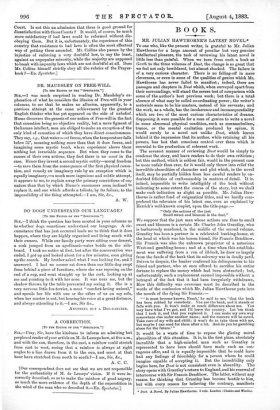DR. MAUDSLEY ON FREE-WILL.
[To THE EDITOR Or THE "SPECTATOR.") was much surprised in reading Dr. Maudsley's ex- planation of what he considers the illusion of Free-will in your columns, to see that he makes no allusion, apparently, to a previous attempt at the same achievement by the greatest English thinker who has yet appeared on the side of unbelief. Hume discovers the genesis of our notion of Free-will in the fact that causation being no objective reality, but a mere figment of the human intellect, men are obliged to make an exception of the only kind of causation of which they have direct consciousness. They say, e.g., that water must freeze, when the temperature falls below 32°, meaning nothing more than that it does freeze, and imagining some mystic bond, where experience shows them nothing but invariable sequence. But when they come to the causes of their own actions, they find there is no must in the case. Hence they invent a second mystic entity—moral freedom —to save them from the consequence of the first physical causa- tion, and remedy an imaginary rule by an exception which is equally imaginary,—a much more ingenious and subtle attempt, it appears to me, to explain away the primary convictions of our nature than that by which Harne's successors seem inclined to replace it, and one which affords a tribute, by its failure, to the impossibility of the thing attempted.—I am, Sir, &c.,
A. W.


































 Previous page
Previous page